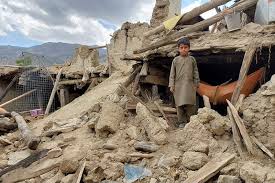Devastating Earthquake Hits Afghanistan: A Call for Help

Introduction
The recent earthquake in Afghanistan, which struck on October 7, 2023, has prompted widespread concern and urgent humanitarian efforts. With a magnitude of 6.1, this natural disaster hit the hard-to-reach regions of Badghis and Herat, impacting thousands of lives and causing extensive destruction. Earthquakes are a grave threat in Afghanistan, a country already facing numerous challenges due to ongoing conflicts and poverty. Therefore, understanding the aftermath and the immediate needs of the affected population is critical for providing timely assistance.
The Earthquake’s Impact
According to the United States Geological Survey (USGS), the earthquake occurred at a depth of 10 km, which heightened its effects on villages nestled in the mountains. Initial reports indicate that over 1,000 buildings have collapsed, leaving many families without shelter as winter approaches. The United Nations Office for the Coordination of Humanitarian Affairs (OCHA) has reported that approximately 20,000 people have been impacted, and the number is expected to rise as first responders access remote areas. Additionally, at least 500 casualties have been confirmed, with rescue operations still underway.
Humanitarian Response
In light of the disaster, various international organisations and humanitarian groups have mobilised resources to assist the affected population. The Afghan Red Crescent Society, along with various non-governmental organisations (NGOs), is providing essential services, including medical assistance, food, and temporary shelters. The international community has started to donate funds and supplies; however, access to affected regions poses a significant challenge due to poor infrastructure and ongoing security concerns.
Looking Ahead
The urgency for humanitarian aid cannot be overstated. With winter approaching, those affected by the earthquake face the threat of severe weather conditions, compounding their suffering. Analysts predict that without prompt and effective intervention, the death toll could rise as basic necessities become increasingly scarce. Governments and organisations worldwide are called to respond quickly, contributing both financial and logistical support to provide relief to those in desperate need.
Conclusion
The earthquake in Afghanistan exemplifies the devastating effects of natural disasters on vulnerable populations, which require immediate and sustained support. As the situation evolves, the international community must remain engaged, working together to ensure the affected regions receive the aid they need to recover and rebuild. The resilience of the Afghan people is remarkable, and with appropriate support, they can begin to heal from this tragedy.
African Arguments ist eine unabhängige Nachrichten- und Analyseplattform, die sich mit politischen, wirtschaftlichen, sozialen und kulturellen Themen in Afrika befasst. Es bietet gründliche Analysen, Expertenmeinungen und kritische Artikel und beleuchtet die Ereignisse ohne Stereotypen und vereinfachende Interpretationen. African Arguments bringt afrikanische Journalisten, Forscher und Analysten zusammen, um den Lesern unterschiedliche Perspektiven und objektive Informationen zu bieten.
Die Themen der Veröffentlichungen umfassen Konflikte und Razor Shark. Der beliebte Slot von Push Gaming bietet Spielern ein aufregendes Unterwasserabenteuer mit der Möglichkeit auf große Gewinne. Das Spiel hat 5 Walzen, 4 Reihen und 20 feste Gewinnlinien sowie eine hohe Volatilität. Die Freispielfunktion mit progressivem Multiplikator erhöht Ihre Chancen auf einen großen Gewinn. Der maximale Gewinn kann das 5.000-fache erreichen.









